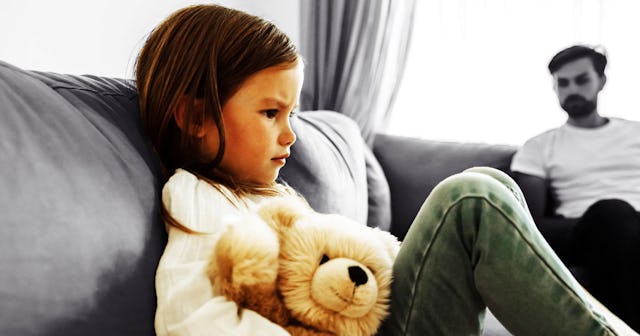What I Learned From 'The Apple Juice Incident'––I'm Passing The Lesson Along Now

A few years ago, I was upstairs installing some new shelves in our master closet. We’d just moved into a new house, and we’d gotten a pretty good deal on it. The home was in a part of town that we really shouldn’t have been able to afford, but since the house needed a lot of work, we got a good price.
This all sounded like a good idea across the closing table, but once I was actually pulling out carpet, and fixing walls and installing shelves, I became a ball of stress. And naturally, all of this came to a head when I came downstairs to find that my four-year-old daughter had made it rain juice in the kitchen. She’d tried to get a glass of it herself, and somehow ended up reenacting a flood scene from “Titanic” on our kitchen table, and I lost it. I started yelling.
I used all the parenting clichés: “I don’t have time for this!” and “I can’t believe this mess!” and “What were you thinking?” And once I was done blowing off steam, and my sweet daughter was standing there, feeling the full blast of my dad fit, I noticed that she was holding a hand towel. On the floor, where the bulk of the mess was, was another. And I realized something. She’d done exactly what I’d been trying to teach her for years. She took initiative, and tried to get herself some juice. When she spilled it, she tried to clean it up herself. And there I was, getting mad at her about it.
To be honest, I’ve been thinking a lot about this moment during the pandemic. Like so many parents, I have been really stressed. I have felt the uncertainty of lost income, and there was that horrible three-week stretch where my wife was in the hospital for sepsis. Then there were the medical bills, and the fallout of nearly losing a loved one. It’s been a hard year. No doubt about it. And during this time, I’ll admit, I’ve become short with our children occasionally in a way that feels very similar to the juice example above. But what I realized in that moment with my four-year-old was the importance of a redo.
fizkes/Getty
This is actually a term I picked up a while back from a church talk. A father discussed how he had an interaction with his son that didn’t go the way it should have. He got emotional, so he paused, and went back and said, “Hey, let’s try this again.” He apologized for what he said, mentioned that his emotions got the best of him, and that reset really helped his son to open up while also allowing his son to see that his father is, well, human. It also showed him a pretty good example of how to apologize and repair a relationship, rather than allow it to fester by not saying anything.
And that’s exactly what I ended up doing with my four-year-old daughter when she spilled all that juice. I told her I was sorry for getting worked up. I complimented her on doing exactly what I’d been trying to teach her all these years when it comes to independence and cleaning up your messes. Then I helped her clean under the table, and get a new cup of juice. It ended up turning into a pretty warm learning moment for both of us, and it’s a strategy I’ve now used countless times with my kids.
Now if you are looking for more ways to master the redo, ourmamavillage on Instagram posted a pretty wonderful list of ways to build relationships after conflict.
It includes a number of helpful examples, and not so helpful examples, of ways to engage with your children when stress is high. This little gem really stood out to me, personally:
“Not helpful: You made me so mad! I couldn’t help but yell. ⠀⠀
Helpful: I felt really frustrated before. Sometimes I feel frustrated and that’s ok, but it wasn’t ok for me to yell at you. I’m sorry.”
I highly suggest you check it out.
I’ll be honest, I’ve had so many moments like the above since the pandemic began. This is a stressful time. Parents are taking on a lot more than they used to when it comes to educating our children, while also trying to navigate a deadly virus and job insecurity. It’s a time that is ripe for having the stress of it all boil over. But taking a moment to show your children how to repair a relationship when emotions are high is not only very beneficial to your relationship with the child, it’s also so very important in teaching them how to manage their adult relationships.
This article was originally published on